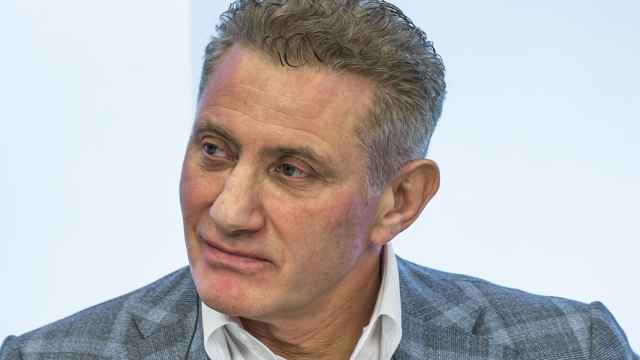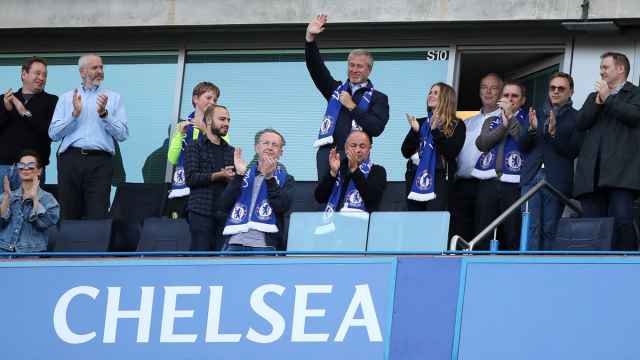Prime Minister Dmitry Medvedev said he saw no reason for Moscow to cut gas supplies to Ukraine over an unpaid bill for now, playing down talk of an imminent "gas war" that might disrupt flows to Europe.
In an interview, Medvedev also spoke of ensuring an investment-led recovery for Russia's struggling economy by boosting access to affordable loans.
Medvedev denied that Russia's demands for payment from Ukraine had anything to do with opposition to Ukraine signing agreements with the European Union this month, which would mark a historic shift away from former imperial master Moscow.
But the 48-year-old ex-president said the "special relationship" between the two former Soviet republics would change if Ukraine moved closer to Europe and that Kiev should no longer come to Moscow seeking loans.
Russian gas export monopoly Gazprom said Tuesday that Ukraine, which is dependent on supplies of Russian gas, had failed to settle a $882 million bill for August deliveries and demanded it be paid urgently.
"We understand that they have economic difficulties, but they still have to pay, especially after we gave them loans and financed transit," Medvedev said in the interview late last week, adding that the transit fees cost billions of dollars.
Russia could resort to a system of advance payments if Ukraine does not respond to its demands, Medvedev said.
As it nears a payment crunch to service its debt over the next 18 months, Ukraine has asked for leniency from Russian creditors, including trying to extend the term of a $2 billion loan from Russia's Gazprombank by five years. Just last month, Putin said Russia would lend $750 million to Ukraine.
Medvedev said if Ukraine moved closer to Europe by signing an association agreement with the EU at a summit from Nov. 28 to 29, and joining a free trade pact, Brussels could then foot the bill.
Turning to Russia's economic prospects, Medvedev said the country must boost the flow of credit to businesses to promote an investment-led recovery but will not throw fiscal caution to the wind to overcome the drag on the economy from weak exports.
There is no contradiction between fiscal consolidation and economic development, Medvedev said, adding that the government would press on with privatization at the right price.
The priority, he said, was boosting growth that he said was too low at an expected level of less than 2 percent this year after averaging about 7 percent for much of the decade before the global crisis of 2008-09.
Medvedev said a vital first step to steer the $2 trillion economy away from recession was to ensure affordable credit flows into the economy.
This position sits uneasily with that of new Central Bank chief Elvira Nabiullina, who has said that cheaper credit might not help the economy and could be counterproductive.
The Central Bank has held its main interest rate of 5.5 percent steady for more than a year despite pressure to reduce it but the costs of borrowing, even for large companies, is usually about 9 or 10 percent.
Kiev is able to cover payments for Russian gas without additional borrowing and hopes to resolve its differences with Moscow in the near future, Ukrainian Energy Minister Eduard Stavitsky said in an interview Friday.
Senior officials from the EU said the EU was in advanced discussions with the International Monetary Fund on providing standby financing to Ukraine should the country come under economic pressure from Russia later this year. It is estimated that a standby facility between $10 billion and $15 billion may be necessary for Ukraine to pay its debt.
"What loan? I am hearing about this from you for the first time — you have lots of information. We always settle bills using our own funds, not from borrowing," Stavitsky said on the sidelines of a meeting in a Moscow suburb.
A Message from The Moscow Times:
Dear readers,
We are facing unprecedented challenges. Russia's Prosecutor General's Office has designated The Moscow Times as an "undesirable" organization, criminalizing our work and putting our staff at risk of prosecution. This follows our earlier unjust labeling as a "foreign agent."
These actions are direct attempts to silence independent journalism in Russia. The authorities claim our work "discredits the decisions of the Russian leadership." We see things differently: we strive to provide accurate, unbiased reporting on Russia.
We, the journalists of The Moscow Times, refuse to be silenced. But to continue our work, we need your help.
Your support, no matter how small, makes a world of difference. If you can, please support us monthly starting from just $2. It's quick to set up, and every contribution makes a significant impact.
By supporting The Moscow Times, you're defending open, independent journalism in the face of repression. Thank you for standing with us.
Remind me later.





